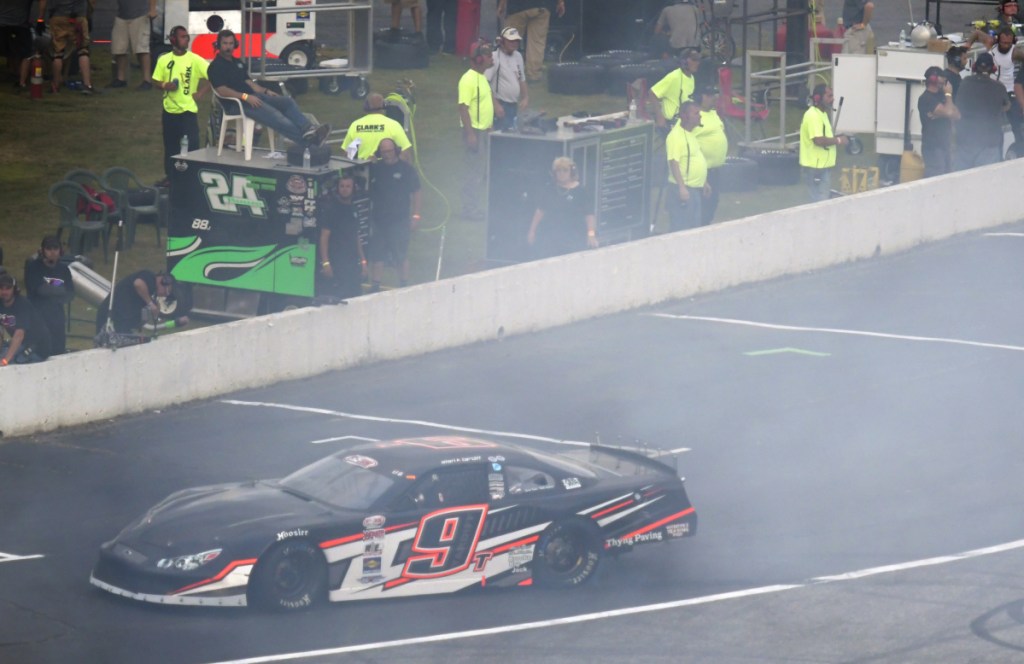OXFORD — There is a caveat. There is always a caveat.
It was only a few days ago that Curtis Gerry was reliving his Oxford 250 win last summer and looking ahead to his chances this season. He wanted a good qualifying draw, which most drivers do, to make the likelihood of qualifying less stressful. He talked about the advantages of a clean race without a lot of chaos, and how he believed he’d be there once again in contention for the victory.
“It’s not me, it’s the car,” Gerry said. “The car has shown that over and over, that it’s always there in the end…”
And then came the caveat.
“…unless something happens.”
Something did happen, something the 47-year-old Gerry probably didn’t even waste time considering. Why would he? His No. 7G’s past 12 months at Oxford Plains Speedway were record-setting. Before he could even complete a single lap in his first-round heat race, Gerry’s day unraveled.
Smoke streamed from beneath his race car as the rest of the field roared to life, leaving Gerry in their wake. What looked like a sloppy start, a missed shift or — at the very least — a rare moment of Gerry being caught sleeping behind the wheel turned out to be much, much worse.
Mechanical failure in the rear end forced Gerry to pull off the track and into the pit area, where his crew was thrashing underneath it in a mad dash to make repairs. They did, at least enough so he could take a stab at a consolation race. Gerry recovered to win the last-chance qualifer, but the frustrating day ended when he crashed with Cassius Clark on lap 206 while trying to race back to the front following pit stops.
It’s just another perfect illustration of what makes the Oxford 250 the Oxford 250.
It’s not just a Pro All Stars Series race. It’s not just another race with tens of thousands of dollars in purse money. It’s a race which utilizes a car’s performance, pit strategy, tire management, driver skill in heavy traffic and, of course, luck.
But that recipe remains perfect. Under different management, under different rules packages, and even under different touring series, the Oxford 250 championship formula has been the same for at least three decades now.
Farmington’s Cassius Clark told the Sun Journal this week that it’s “a race that either you win or you don’t.” Morrill’s Travis Benjamin said famously this summer, “Nobody knows about the PASS championships I’ve won, but they know about the Oxford 250s I’ve won.”
Mike Rowe is arguably the most accomplished short track racer Maine has ever produced, but his career is defined by his success in the Oxford 250. Larry Gelinas and Jeremie Whorff would be but footnotes in the state’s racing history, except their respective Oxford 250 wins give them gravitas.
Gelinas won in 1996, in one of the strangest 250s ever, with a young Ben Rowe on his way toward certain victory before running out of fuel in the closing laps. Whorff won when crate engines first invaded the Super Late Model landscape, catching some of the region’s best teams completely off guard.
It’s how it is with virtually all 45 editions of Maine’s largest annual sporting event. Every winner, every runner-up, every did-not-qualify has a story.
And with that story, as always, there is a caveat.
Travis Barrett — 621-5621
tbarrett@centralmaine.com
Twitter: @TBarrettGWC
Copy the Story LinkSend questions/comments to the editors.




Success. Please wait for the page to reload. If the page does not reload within 5 seconds, please refresh the page.
Enter your email and password to access comments.
Hi, to comment on stories you must . This profile is in addition to your subscription and website login.
Already have a commenting profile? .
Invalid username/password.
Please check your email to confirm and complete your registration.
Only subscribers are eligible to post comments. Please subscribe or login first for digital access. Here’s why.
Use the form below to reset your password. When you've submitted your account email, we will send an email with a reset code.